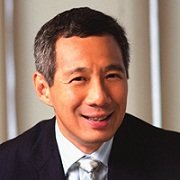Translated by Donaldson Tan

On 16 April 2011, Prime Minister Lee Hsien Loong hosted a mandarin TV forum “live”, engaging a panel of 12 Singaporeans from a cross-section of the population on a wide range of topics. The hour-long programme – Question Time with the Prime Minister – was shown “live” on Channel 8 from 8pm to 9pm. Topics for discussion include social, political and long term issues facing Singapore. There are 4 segments to the debate.
This is Part 1. Click here for: [Part 1] [Part 2] [Part 3][Part 4]
Moderator [Zeng Yeli]:
Good evening, everyone. Welcome to Question Time with the Prime Minister. Tonight, we invited Prime Minister Lee Hsien Loong and 12 Singaporeans from all walks of lives, age ranges from 20 years to 72 years to this studio to participate in tonight’s forum. We also received many questions via email and sms in the last few days. two-third of the questions received were on livelihood whereby housing and healthcare are 2 major concerns while the remaining questions are on political issues.
Now we shall begin this forum by discussing livelihood issues. I believe everyone by now should have received the government’s Share & Grow Package. Some people say this is a General Election handout. Zhanhui, I understand you are regularly come in contact with low income groups. Will the Share & Grow Package be very useful to them?
Leng Chin Fai [Director, Feiyue Family Service Centre]:
I think this is what middle and low income groups look forward to. Facing inflationary pressure, the Share & Grow Package would provide them with a temporary sense of relief. However, if inflation persists in the long term, they still face economic insecurity. They would like to know what the government would do within its means to curb inflation. While electricity is subjected to global energy price movement, what about areas such as water price and other administrative charges? Like GST, would the government pledge not to raise other rates & charges?
Moderator [Zeng Yeli]:
Di Cong, you host a regular radio talk show where listeners call in and raise issues. What are your listeners’ views on livelihood issues such as the cost of living?
Wang Di Cong [Radio Host, Capital 95.8 FM]:
They are concerned on the government’s policy direction. For example, Minister Mah Bow Tan raised the question of linking HDB prices to income level on 14 April 2011 (Thurs). He said HDB price will depreciate if they are linked. On the following day, a lot of listeners called in and all their views are collected here [holding up a stack of paper]. I was unable to response to every comment or question.
I believe the government has collected feedback on many fronts before implementing emergency cooling measures on the ‘hot’ property market. Let me quote a representative view from one listener. He said, if HDB price were to depreciate upon linked to the income level, wouldn’t it not imply that the median income cannot catch up with rocketing HDB prices?
Lee Hsien Loong [Prime Minister]:
I see this as 2 different problems. One is the cost of living. Everyone is concerned about the cost of living because there is a spike in HDB prices. This is due to international factors. Budget 2011 provides a comprehensive Share & Grow Package for every Singaporean. While the angbao hasn’t arrived, the notification letter has already been delivered. At the same time, we have advertised on the newspapers information on public assistance and details about measures on how the government would help Singaporeans.
For example, today’s Straits Times has a feature on it and I would like to take the opportunity to promote the Ministry of Finance’s advertisement and elaborate on the package. Depending on the size, every household is entitled to $3,000 to $4,000. The details of every measure are there. Next week, we will roll out the Chinese, Malay and Tamil editions. We hope this will promote understanding of what the government is doing and the government’s perspective on cost of living and housing prices. In the long run, I don’t think housing prices will appreciate at the same rate as last year’s. Housing prices should be stable in the long run.
For the last few years, Singapore has been able to cope with inflation. However, I think the best approach for Singaporeans to cope with inflation is to raise the income level, self-sufficiency and productivity. If you have a job, you have a salary and you can take care of your family. There are rise and fall in housing price, and sometimes the price changes are unavoidable. If you can maintain a job, you should be able to cope with the price movements. On housing price, we require that it remains stable over the long run. If there is economic growth, income level will rise and housing price will appreciate gradually in tandem. This is because the housing price reflects the prosperity of a nation and the owner’s confidence of the nation’s outlook.
If a serious problem crops up in the country, surely the housing price will drop. However, Singaporeans are confident of our country, so housing price definitely appreciates. However, the government would not make public its opinion on whether housing price is too high. There would be impact on the housing market if the government says the housing price is too high or too low. What the government can say is that it wants to prevent huge swings in housing prices. It is not good if housing prices raise too fast or drop too fast. What the government can pledge is housing remains affordable, especially public housing built by the HDB. This is not just a forecast but also our promise – something that is within our means.
Moderator [Zeng Yeli]:
I would like to raise a question from a member of the public. Teo Yong Siew said in an email that the handout of the Grow & Share package depends on the type of housing. However, it is not necessarily true that Singaporeans living in private housing are richer than those living in HDB flats as there are many high income Singaporeans living in HDB flats. As a result, the poorer Singaporeans who live in private housing are unable to enjoy benefits such as utility rebates. Shouldn’t the handout be dependent on income level instead? Professor Wang is a retiree. Do you agree with the government’s approach?
Wang Yong Bing [Retired Professor]:
I am a retiree and have no income. My Grow & Share Package handout is only $100. However, I would not go as far to say that some segments of population are undeserving. If the handout is determined by housing type, there would some imperfect and unfair outcome because families who live in 3-room HDB flats are not necessarily poor while those who live in 5-room HDB flats are not necessarily rich. This is an administrative problem. If the government doesn’t simplify the criteria, it would not be able to process the Grow & Share Package quickly. I would like to invite the Prime Minister to share his insight on this administrative hurdle.
Lee Hsien Loong [Prime Minister]:
There are many measures in the Grow & Share Package and the criteria to qualify for each measure is different. For example, utility rebates is determined by the type of housing because this is the simplest way of doing it. However, the individual’s bonus component of the Grow & Share Package is determined by his income and type of housing. Mr Wang received $100, so I reckon he does not live in a 3-room HDB flat.
Wang Yong Bing [Retired Professor]:
I live in private housing.
Lee Hsien Loong [Prime Minister]:
Private housing is one of the criteria for determing the bonus component. It is very difficult for the government to understand the situation of every household, so we make judgement calls to be as fair as possible. If you live in private housing, it is very unlikely that you are part of a low income household. Each measure has its own set of criteria and they are not perfect. However, overally speaking, I believe every Singaporean should get a sum he deserves more or less.
Moderator [Zeng Yeli]:
We received a SMS from a member of the audience. He said he is upset by amendments to the Central Provident Fund. He is 52-year-old and has to work until the age of 65 years since he has little savings and receives a low income. He is worried that he may not be able to work till 65 due to deteriorating health. How is he going to survive if he cannot work or withdraw money from his CPF? Mr Toh, you are a trade union leader. What is your view on his plight?
Toh Hock Poh [President, Metal Industries Workers' Union]:
As long as he remains employed, he should be able to afford healthcare and there would be assistance from his employer to cover his medical bills.
Moderator [Zeng Yeli]:
Madam Wang is one of the panellists. She is a taxi driver who receives no CPF contribution from her employer. She is a mother of young child.
Wang Siew Yue [Taxi Driver]:
I would like to ask the Prime Minister on single-parent families. Can the government increase the handout of Grow & Share Package for single parents, especially single mothers?
Lee Hsien Loong [Prime Minister]:
The issue of single-parent families is a difficult problem because single-parent families are different from normal families. Hence, the government has to study the problem and identify the best solution. I think problems not only manifest in the handout components, but also in the daily lives of single-parent families. The single parent shoulders the responsibility of bringing the bacon home and taking care of the children. The government sympathises the plight of such families, so the government has to figure out a comprehensive policy to take care of single-parent families the next time.
On CPF, there are many levels to the answer. Every Singaporean should perceive the minimum sum component as his principal for retirement. It should only be used as when one is no longer capable of working. It should be part of your savings, not your only asset. Outside your savings, there should also be more options available. For example, Mr Toh mentioned that majority of over 50-year-old Singaporeans are still working. The government has many policies that encourage these employees to continue to work and policies that encourage employers to hire these workers.
To encourage employers to hire older workers, older workers enjoy a higher Workfare Income Supplement (WIS). The government has approved re-employment policies for workers who have retired. If one is no longer capable of working, he can depend on the monetisation of his HDB flat. I believe every Singaporean owns a HDB flat and its value would be very high. High value is a good thing to a home owner. Don’t sell your home, but you can either rent out a room or move in with a child while renting out the entire flat. These are practical solutions to how Singaporeans can cope with the cost of living.

